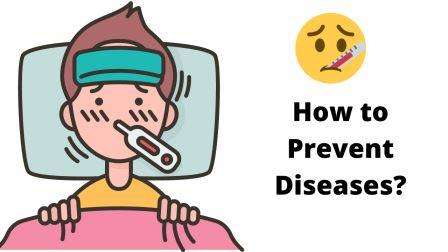Q- What is the basic key to prevention of infectious diseases class 9?
Answer- The basic key which helps in the prevention of infectious diseases is to take a balanced nutritious diet and maintain proper hygiene because taking a balanced and nutritious diet makes our body healthy and our immune system stronger. This helps in preventing several diseases and maintaining proper hygiene helps in preventing microbes of several diseases from entering your body and making you ill.
Other Important Questions
- What kind of soils are needed for Natural vegetation
- Why health and disease are antagonistic to each other
- Define Immunization
In the above answer, we told you about what is the basic key to prevention of infectious diseases. This answer is especially for class 9th students.
So, the basic key which helps in preventing infectious diseases is to take a healthy and nutritious diet that will make your immune system strong.
If you want to learn more about some ways that will help in preventing infectious diseases. Then you should read the content given below.
In it, we are going to cover a little bit about diseases and some ways to prevent diseases especially infectious diseases.
Disease
A Disease is a kind of abnormal condition that negatively affects the structure as well as the function of all or a single part of an organism, and that is not immediately caused due to any kind of external injury.
Diseases are often known to be medical conditions that are associated with specific signs & symptoms.
A disease may be caused by some external as well as internal factors. External factors such as pathogens and internal factors as dysfunctions.
For example, internal dysfunctions of the immune system can produce a variety of different diseases, including various forms of hypersensitivity, immunodeficiency, allergies, and autoimmune disorders.
In human beings, the disease is often used more broadly to refer to any condition that causes uneasiness, pain, social problems, dysfunction, distress, or sometimes death to the affected person, or similar problems for those in contact with the person.
In this broader sense, it sometimes includes injuries, disabilities, syndromes, disorders, infections, isolated symptoms, deviant behaviors, and also typical variations of structure and function, while in other contexts and for other purposes these may be considered distinguishable categories.
Diseases not only affect the person physically but also mentally, as contracting and living with a disease can alter the affected person’s perspective on life.

A death that was caused due to disease is called death by natural causes. There are four main types of disease:
- Infectious diseases
- Deficiency diseases
- Hereditary diseases (It includes both genetic diseases and non-genetic hereditary diseases)
- Physiological diseases
Diseases can also be further classified into two different types that are communicable and non-communicable diseases.
The deadliest diseases in humans are coronary artery disease (blood flow obstruction), followed by cerebrovascular disease and lower respiratory infections.
In developed countries, the diseases that cause the most sickness overall are neuropsychiatric conditions, such as depression and anxiety.
Basic key to the prevention of Infectious diseases
Some of the basic keys for the prevention of infectious diseases are given below:
- We should prepare our food with proper cleanliness.
- We should wash our hands regularly.
- We should Sneeze and Cough on tissue paper to avoid spreading disease-causing microbes.
- Get vaccinated with regular doses timely.
- We should stay at home when we are feeling unhealthy or sick.
- We should avoid drinking alcohol.
- We should quit smoking as it is very dangerous to our health.
- We should do physical exercises regularly to remain physically fit and healthy.
- Do not eat too much fast food.
- Practice yoga daily at least for 10-15 minutes.
